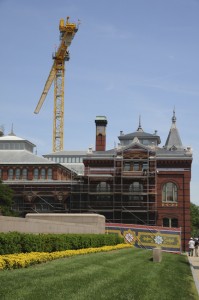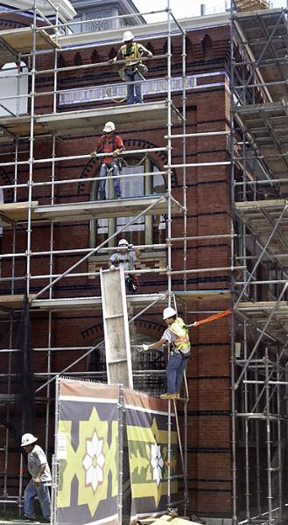An economic boost is also an environmental plus
The Smithsonian Institution is the first of 28 federal agencies to complete all projects funded by the American Recovery and Reinvestment Act of 2009. The 11 projects funded by Recovery increased energy efficiency or sustainability at SI’s Washington, D.C., facilities, including the National Zoo.
A direct response to the economic crisis, the Recovery Act has three immediate goals:
- Create new jobs and save existing ones
- Spur economic activity and invest in long-term growth
- Foster unprecedented levels of accountability and transparency in government spending

The floor of the Arts and Industries Building was removed to expose the original 1902 floor which was then restored.
While many of Recovery Act projects are focused more immediately on jumpstarting the economy, others, especially those involving infrastructure improvements, are expected to contribute to economic growth for many years.
The 11 projects involving repair or renovation of Smithsonian facilities were paid for with $25 million in Recovery contracts. All work was done by local firms.
Walt Ennaco, acting director of the Office of Planning and Project Management, explained that “the basic criteria to become a Recovery project was for [the project] to be an urgently needed critical revitalization not already covered in anticipated Fiscal Year 2009 funding; projects had to be energy-efficient or sustainable, in whole or in part.” All projects contributed to increasing energy efficiency or environmental sustainability in some way. For example, although exterior masonry repairs and hazardous material removal comprised the bulk of the work at the Arts and Industries Building, this work must be done prior to the future replacement of ageing electrical and mechanical systems with energy-efficient equipment. New insulated roofs and windows for several buildings at the National Zoo are similarly energy-efficient. Other projects involved creating better storm drainage and protecting potable water sources from possible contamination. New outdoor lighting systems have enhanced safety and security for visitors, staff and animals at the National Zoo.
The Smithsonian’s Recovery-funded projects include:
- Clean, rebuild and refurbish the masonry façade of the Arts and Industries Building.
- Remove non-historic partitions, walls and flooring in the Arts and Industries Building to expose and restore original period (1902) walls and flooring.
- Add new fire-prevention systems at the National Zoo.
- Replace roofs on multiple buildings at the Zoo.
- Replace deteriorated animal-holding facilities at the Zoo.
- Resurface traffic lanes and repair masonry of three stone bridges at the Zoo.
- Install new code-compliant, high-voltage connections at multiple locations on the National Mall.
- Install sewage backflow preventers on potable water lines at multiple locations off the National Mall and at the Museum Support Center in Suitland, Md.
- Refurbish or replace elevators and escalators at the National Air and Space Museum and National Museum of American History.
- Install emergency generators at the Smithsonian Environmental Research Center at Edgewater, Md.
- Hire temporary support personnel.

Left: Stone bridge in National Zoological Park before resurfacing and masonry repair, completed at right.
Recovery funding allowed the creation of 186 jobs. According to Ennaco, “All but two of the construction contracts were awarded competitively to Small Business or minority-owned firms, so every project put money back into the local economy.”
Posted: 26 July 2011
- Categories:





